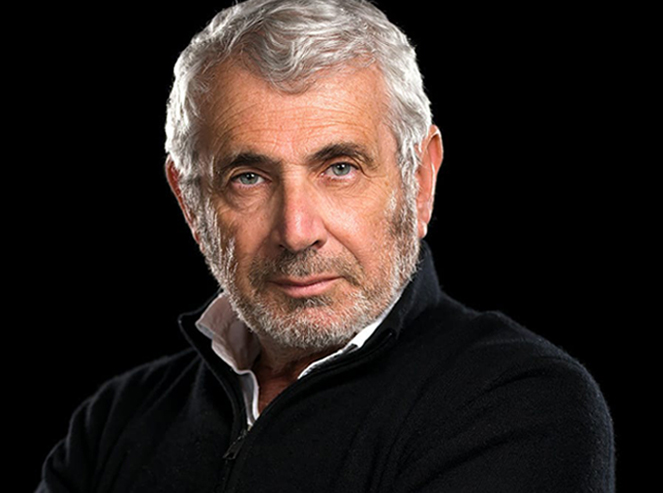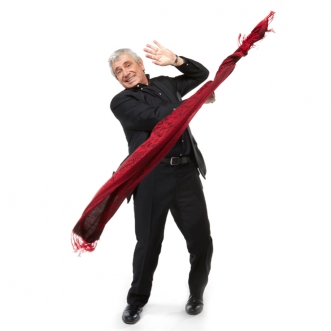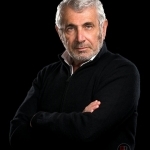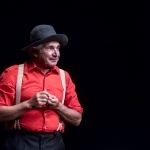humour
Michel Boujenah

Présentation du spectacle
Nouveau spectacle : " Adieu les magnifiques "
Tournée 2023/2024
A Paris, Théâtre de la Madeleine, à partir du 26 janvier 2023
La saga des magnifiques remise au gout du jour.
Le théâtre est à la fois éphémère et éternel. J’ai, il y a bien longtemps, j’ai écris une phrase qui pourrait être mon blason :
« Tant qu’il y aura des auteurs pour nous écrire et des acteurs pour nous jouer on sera éternels »
Alors j’ai décidé de dire adieux à ces personnages que j’aime tant. Maxo, Julot, Guigui, mes trois petits vendeurs de pantalons. Mes trois héros d’une aventure où ce qu’ils doivent sauver c’est la mémoire. Ils sont drôles et bouleversants. Ils sont la version imaginaire de la génération de mon père. Bien avant internet et le reste ils s’inquiétait de savoir si on se souviendrait d’eux ,dans deux ou trois générations. Ils disent souvent :
- « Dans deux ou trois générations Les magnifiques ? Les magnifiques?… Ce n’est pas une marque de fromage ? »
Le décalage entre eux et leurs petits enfants est tel qu’ils sont sûr qu’ils vont disparaître. Mais c’est sans compter sur le bon dieu qui viendra à leur secours.
Alors à travers le rire et l’humour qui les caractérise ils vont se battre et bien sur gagner.
« On ne peut pas savoir où va si l’on oublie d’où on vient »
Alors ce sont des héros à la hauteur de Spartacus ou de Skylwaker ou de Ulysse.
Bien sûr c’est une nouvelle version remplie de nouvelles choses tout simplement parce que les temps changent. EN puis arrive peut-être la plus belle des magnifiques : « SIMONE BOUTBOUL » Elle va parler avec ses arrières et ses petits enfants du monde d’aujourd’hui.
Bien vous vous posez la question : « Mais est-ce que c’est drôle ? »
Venez et vous verrez.
Je vous embrasse tous.
MICHEL BOUJENAH
Biographie
1967-68 - Début et découverte du théâtre à l'école Alsacienne.
- Premières représentations à la salle Gémier au Théâtre National de Chaillot et aux Tréteaux de France.
- Tournée en charrette et chevaux dans le sud-ouest de la France avec Mireille Larroche et Philippe Hottier qui rentrera peu de temps après au Théâtre du Soleil.
1969 - Stagiaire sur les « Camisard » de René Allio. C'est lors de ce tournage que je rencontre Jean-
Pierre Vincent, Jean Jourdheuil, jean Bouise et bien d'autres. Ce moment sera fondateur.
1970 - Echec au Conservatoire National de Strasbourg.
- Auditeur libre aux répétitions de la compagnie Vincent-Jourdheuil.
Je suis les répétitions de « dans la jungle des villes » entres autres et j'ai la chance d'assister au travail de Philippe Clévenot, Gérard Desarthe, Maurice Bénichou, etc.
1971 - Création de la Compagnie de la Grande cuillère.
- Mise en scène et création de LA CHÂSSE D'ELIE PRESMANN au Théâtre Cyrano.
- Stagiaire sur « Rude journée pour la Reine » de René Allio
Pendant ces années commence en parallèle le travail d'animation dans les cités de transits avec des enfants venus de pays divers. Mais aussi l'aventure bouleversante et fondamentale avec des élèves de classe d'adaptations en collaboration avec le centre médico-psycho-pédagogique de Claude Bernard. Je suis engagé par l'Education Nationale comme maître auxiliaire. Le soutien de Françoise Dolto ou Daniel Carlin m'a permis de mener ce travail pendant huit ans. Les élèves ont écrit et joué de nombreux spectacles dans les lycées mais aussi par exemple à la Cartoucherie.
1979 - PENELOPE ET ULYSSE au Théâtre Mouffetard, création collective
- PARIS C'EST GRAND au Palace sous la direction de Pierre Laville, création collective
- LES BELLES HISTOIRES N'ONT PAS D'ISSUES au Théâtre de l'Aquarium, création collective
- MACADAM 4 ETOILES au Théâtre Oblique, création collective
- LA COLLINE DE DUNSINANE, mise en scène: Olivier PERRIER.
1987 - Création de mon premier seul en scène ALBERT au Lucernaire, Paris
Derniers spectacles
THÉÂTRE / SEUL EN SCÈNE :
2019 L’AVARE de Molière mise en scène Daniel Benoin
2018 MA VIE ENCORE PLUS REVEE au théâtre de la Gaîté-Montparnasse
2013 MA VIE REVEE
2008 ENFIN LIBRE ! au Théâtre National de Nice2004 LES NOUVEAUX MAGNIFIQUES, mise en
scène Corinne Atlas au Théâtre National deNice
Reprise au Théâtre du Gymnase à Paris
1999 MON MONDE A MOI
1994 LE PETIT GÉNIE au Théâtre de la renaissance Olympia
1991 ELLE ET MOI mise en scène de Michèle GODDET au Théâtre de Nice
Reprise au Théâtre du Gymnase. 100 représentations en France, Suisse et Belgique
1987 L’ANGE GARDIEN mise en scène de Paul BOUJENAH
Création à l’Olympia, textes des chansons de Daniel LEVY et M.BOUJENAH, musique de
Francis LALANNE et Gerard PRESGURVIC
Tournée de 8 mois, reprise au théâtre du gymnase de Septembre 1988 à Février 1989
1984 LES MAGNIFIQUES mise en scène de Paul Boujenah
Création au Splendid, 1 an de tournée en Belgique, Canada, France
1983 ALBERT
1981 ANATOLE mise en scène Corinne Atlas
CINEMA liste non exhaustive :
1996 DON JUAN adaptation de la pièce au cinéma, réalisé par Jacques Weber
1993 LES MISERABLES de Claude Lelouch
1992 LE NOMBRIL DU MONDE de Ariel Zeitoun
1987 LEVY ET GOLIATH de Gérard Oury
1986 PRUNELLES BLUES de Jacques Otmezguine
MOITIE MOITIE de Paul Boujenah
1985 VOYAGE A PAIMPOL de John Berry
TROIS HOMMES ET UN COUFFIN de Coline Serreau
REALISATIONS :
2016 LES COEURS EN BRAILLE scénario Michel Boujenah et Alfred Lotte
2006 3 AMIS scénario Michel Boujenah et Pascal Elbe
2003 PERE ET FILS scénario Michel Boujenah, Pascal Elbe et Edmond Bensimon
Anouar Brahem English Page
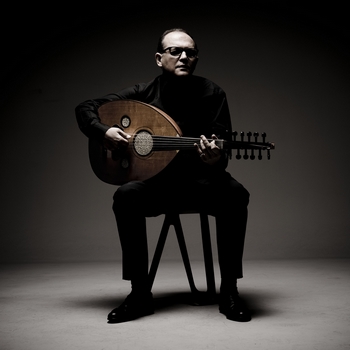
Anouar Brahem Quartet - New program 2024
Anouar Brahem : oud
Klaus Gesing : bass clarinet, soprano saxophone
Björn Meyer : bass
Khaled Yassine : darbouka, bendir
For almost forty years and with a current discography spanning no less than 11 albums on the ECM label, Anouar Brahem has been constantly placing the age-old tradition of Arab music, whose emblem is his oud and its superb finesse, in different situations; not only does he set it in contrast against the free spirit and improvisation so typical of modern jazz, but also against the sophisticated harmonies of the erudite compositional tradition of the West and the refined forms of composition in other ancient cultural traditions from the Orient.
He has organized numerous cross-cultural encounters as well as juxtaposing different musical universes, thereby producing unsuspected potential in new but familiarsounding combinations, something which had never been done before. In 2009, he recorded "The Astounding Eyes of Rita", with a new group that included the soft melding of two sounds: the amazing fluidity of German-born Klaus Gesing on bass clarinet and the flowing notes on the bass guitar of Swedish-born Björn Meyer, to give a mixture of ascetic sophistication and sensuous lyricism so typical of oriental music, declined here by the music of the oud with its notes closely interwoven into the percussive background, played by Lebanese artist, Khaled Yassine. This group has had worldwide
success, both for its rich repertoire and the subtlety of the varied instrumentation, and now, ten years later, it is not only totally up-to-the-minute and more enduring and creative than ever, but Anouar Brahem had made a secret pact with himself never to look back and also vowed to renew his inspiration constantly by accompanying each new project with unusual orchestral combinations. So here, recognizing the lasting qualities of this group, he decided to add a new chapter to this story.
His main resource has been these years of shared experiences with the group, where their coherence and self-confidence has been increasing all the time. Anouar Brahem's new adventure puts his own terrain through the prism of this particular sound universe once again, daring to cast a backward glance at his whole career by mixing a few familiar compositions of the quartet with a scattering of older themes from other projects. This leads to further exploration of the orchestral possibilities of a decidedly unusual instrumentation whose origins lie in an extremely up-to-date kind of cross-cultural chamber music. Within this hugely expansive space, Anouar Brahem and his fellowmusicians
create a softly refined, graceful and dream-like world, borrowed as much
from the contemplative oriental tradition as from jazz. The resulting music, rigorously demanding and poetic, moves constantly between modesty and sensuality, nostalgia and contemplation: it is a magnificently intimate spiritual journey to the heart of sound.
The Astounding Eyes of Rita
Album September 2009, ECM
2019 marks the tenth anniversary of the album. And the interest of the audience is still there, as if it was the first year.
With :
Anouar Brahem: oud
Klaus Gesing: bass clarinet
Björn Meyer: bass
Khaled Yassine: darbouka, bendir
A delightful new assembled by Tunisian oud master Anouar Brahem.
The combination of the bass clarinet with the oud suggests a link to Anouar's Thimar trio, but this East/West line-up often feels closer to the more traditionally-inclined sounds of Barzakh or Conte de l'Incroyable Amour. Klaus Gesing, from Norma Winstone's Trio, and Björn Meyer, from Nik Bärtsch's Ronin, are both players with an affinity for musical sources beyond jazz, and they interact persuasively inside Brahem's music.
A dance of dark, warm sounds, urged onward by the darbouka and frame drum of Lebanese percussionist Khaled Yassine. The album is dedicated to the memory of Palestinian poet Mahmoud Darwish.
Souvenance
Music for oud
Album January 2015, ECM
This project is performed in 2 formations:
- the quartet
with Anouar Brahem (oud), François Couturier (piano), Klaus Gesing (bass clarinet ), Björn Meyer (bass)
- the quartet plus a string orchestra of 20 musicians
Probably Anouar Brahem has never gone so far into the balance between formal elegance and freedom of expression, lyricism and restraint, sensuality and asceticism, as he does here with this new repertoire which seems to ideally synthesize almost fifteen years of his personal and aesthetic quest for an authentic "common understanding" between Orient and Occident. Leading a brand-new Quartet, Brahem here revisits every facet of a musical universe that is at once melancholy and introspective in integrating his sensibilities and instrumental languageundeniably anchored in the Arab traditionwith the Impressionist, evanescent piano of colourist François Couturier, the pulsing sensuality of Björn Meyer's electric bass, and the misty, dreamlike, Nordic romanticism from the bass clarinet of Klaus Gesing.
As if to further emphasize the hybrid nature of his universe, here Brahem plunges his quartet for the first time into the sound-fabric of arrangements that are both sumptuous and minimalist, orchestrating a string-ensemble where the soloists (beginning with the melodic enchantments of the oud) are presented in an organic, voluptuous setting which is particularly stimulating. With ever more refinement in its melodic lines and at once contemplative and subtly narrative in its developments, the music contained in Souvenance possesses those qualities of self-evidence, naturalness and simplicity which are the hallmarks of works of genuine inspiration.
Other show already toured :
Blue Maqam
Album October 2017, ECM
Anouar Brahem: oud
Dave Holland: doublebass
Jack DeJohnette: drums
Django Bates: piano
Prestigious European tours in April 2018 and March 2019 :
Uppsala, Konsert & Kongress (Sweden) | Berlin, Boulez Saal (Germany) | London, Barbican (England) | Dublin, The National Concert Hall (Ireland) | Lyon, Auditorium (France) | Anvers, De Roma (Belgium) | Luxembourg, Philharmonic (Luxembourg) | Morges, Théâtre de Beausobre (Switzerland) | Köln, Kölner Philharmonic (Germany) | Paris, Paris Philharmonic (France) | Blagnac, Odyssud (France) | Zurich, Tonhalle (Germany) | Basel, Musical Theater (Switzerland) | Munich, Philharmoni (Germany) | Hamburg, Elbphilharmonic (Germany) | Lisbon, Gulbenkian Música (Portugal) | Brussels, Palais des Beaux-Arts (Belgium)
Biography
For almost forty years, Anouar Brahem, Tunisian composer and oud master, has been creating music both rooted in a highly sophisticated but ancestral culture and eminently contemporary in its global ambition. Anouar appears in many cross-cultural encounters, as well as developing entirely new links and similarities between styles and worlds whose potential closeness had never been considered until he discovered them. For him it was (and still is) a matter of highlighting the age-old Arab tradition of learned music, represented in its finesse by his oud, not only by confronting his instrument with modern jazz, but also with the sophisticated harmonies of the erudite compositional tradition of the West and refined forms from other ancient cultural traditions from the Orient.
His 11 albums on ECM, label acclaimed by the public and international critics alike (including Astrakan Café, Thimar, Le Pas du Chat Noir, Blue Maqams etc.), together with the triumphant success of his haunting music in concerts held in prestigious halls throughout the world, and his fellow-musicians including a remarkable selection of famous jazzmen such as Jan Gabarek, Dave Holland and jack DeJohnette are sufficient evidence to confirm Anouar's place as one of the most fascinating and inspirational artists in the current world of instrumental music.
His sensitive yet rigorous music constantly redefines a cleverly composite universe of poetry and culture, ever balancing between discretion and sensuality, nostalgia and contemplation.
Awards
De Klara's Classical Music Awards: "Best International CD - World" for Blue Maqams (Belgium, 2018)
Echo Jazz Award: "Best International Musician of the Year" for The Astounding Eyes of Rita (Germany, 2010)
Edison Award for Le Voyage de Sahar (The Netherlands, 2006)
Preis der Deutschen Schallplattenkritik (German Record Critics' Award) for Thimar (Germany, 1998)
National Music Award (Tunisia, 1985)
Reviews
The album is at once an extension and an audacious departure from the tradition of the oud. Despite his formidable knowledge of the maqarnat, an ornate system of modes that anchors Arabic music, he seldom bases his improvisations directly on the maqams. His phrasing is pure and uncluttered, expressing itself through silence nearly as often as sound. ... Composed of elegantly flowing lines and somber, breathlike silences, the music shimmers with the overtones of the piano. ... Mr. Brahem bases several of the tunes on spare, broken chords, repeated in the childlike manner of Satie. Simple though they are, however, they contain beguiling Arabesques. The three musicians rarely appear at once, performing as a trio on only seven of the album's 12 tracks. For the most part, you hear duets - piano and oud, oud and accordion, accordion and oud. The musicians often double each other's lines, but seldom in unison, which enhances the music's intimacy while producing a floating, echo effect.If every band projects "an image of coummunity," as the critic Greil Marcus once suggested, then Mr. Brahem's trio - part takht, part jazz trio, part chamber ensemble - evokes a kind of 21st century Andalusia, in which European and Arab sensibilities have merged so profoundly that the borders between them have dissolved. The image may be utopian, but its beauty is undeniable.
Adam Shatz, The New York Times
Throughout the record, the musicians maintain an exquisite balance and make only subtle changes in tempo or tone. Their sense of melancholy is so natural and comfortable it's childlike. On this tune, "Leila and the Land of the Carousel" a waltzing rhythm and revolving melody suggest a girl on that classic joyride...When he quit the oud for a while and played the piano instead, Anouar Brahem recovered his powers of musical myth-making. On this record, he creates a fairy tale setting and ultimately a storybook ending. The accordion lays down sustained chords like lengthening shadows in a forest. The piano conjures low-key sunlight and offers overtones of reconciliation. And in the arabesque path of "The Black Cat's Footsteps," Brahem finds a way back home to his beloved oud and to the songbird inside.
"All things considered", USA - National Public Radio
Son
Aucun son disponible pour cet artiste
Vidéo
Michel Boujenah
Adieu les Magnifiques
Michel Boujenah
Ma vie rêvée



